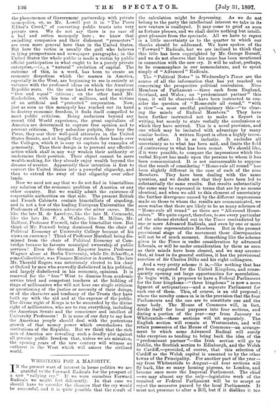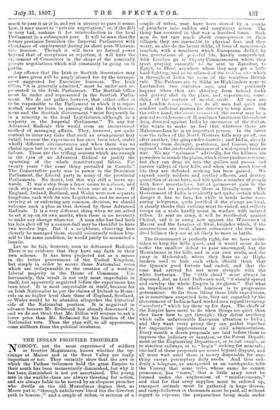WHISTLING FOR A MAJORITY.
IN the present want of interest in home politics we are grateful to the Forward Radicals for the prospect of a new "rallying cry." If we were ourselves Forward Radicals we might feel differently. In that case we should have to consider the chances that the cry would be successful, and it is quite possible that the result of the calculation might be depressing. As we do not belong to the party the intellectual interest we take in its new venture is unalloyed. It may come to grief as soon as fortune pleases, and we shall derive nothing but intelli- gent pleasure from the spectacle. All we have to regret is a little uncertainty as to the quarter to which our thanks should be addressed. We have spoken of the " Forward " Radicals, but we are inclined to think that this title has been copyrighted by Mr. George Russell, and we do not observe that his name has been mentioned in connection with the new cry. It will be safest, perhaps, to be commonplace in our nomenclature, and to speak simply of " Advanced " Radicals.
The "Political Notes" in Wednesday's Times are the source of all the information that has yet reached us concerning the prospective political convulsion. Nine Members of Parliament — three each from England, Scotland, and Wales ; no "predominant partner" this time, it will be observed—have been instructed to con- sider the question of "Home-rule all round," "with a view"—a most needful preliminary this—" to clear- ing the minds of Radical Members." They have been further instructed not to make a Report in writing, but merely to state verbally the conclusions at which they have arrived. This is a novel provision, and one which may be imitated with advantage by many similar bodies. A written Report is often a highly incon- venient affair. It is so inelastic. It excludes all uncertainty as to what has been said, and limits the field of controversy to what has been meant. We should like, if it were possible, to compare the impressions which the verbal Report has made upon the persons to whom it has been communicated. It is not unreasonable to suppose that the result of considering "Home-rule all round' has been slightly different in the case of each of the nine Members. They have been dealing with the same question, and we doubt not that they have been led to substantially the same results. But results substantially the same may be expressed in terms that are by no means identical, and when we add to this element of uncertainty the further divergence caused by the different impressions made on those to whom the results are communicated, we soon realise that there are likely to be as many schemes of "Home-rule all round" as there are "All-round Home- rulers." We quite expect, therefore, to see every particular of the scheme sketched out in the Times contradicted by one or niore Advanced Radicals, and even by one or more of the nine representative Members. But in the present provisional stage of the movement these discrepancies will not be of much moment. Something like the scheme given in the Times is under consideration by advanced Liberals, or will be under consideration by them as soon as their minds have been cleared, and we may assume that, at least in its general outlines, it has the provisional sanction of Sir Charles Dllke and his eight colleagues.
And a very pretty scheme it is,—like nothing that has yet been suggested for the United Kingdom, and conse- quently opening out large opportunities for speculation. To begin with, it proposes to have a Federal Parliament for the four kingdoms—" three kingdoms" is now a mere figment of antiquarians—and a separate Parliament for each one of them. This, of course, is an old proposal ; where the novelty comes in is in the provision that the four Parliaments and the one are to constitute one and the same body. The House of Commons will, in fact, divide itself for local purposes into four sections, and during a portion of the year—say from January to Whitsuntide—these sections will sit separately. The English section will remain at Westminster, and will retain possession of the House of Commons—an arrange- ment to which some Advanced Radical will surely take exception as tending to bring back the idea of the "predominant partner "—the Irish section will go to Dublin, the Scottish section to Edinburgh, and the Welsh to Cardiff,—provided, of course, that this selection of Cardiff as the Welsh capital is assented to by the other towns of the Principality. For another part of the year— say from Whitsuntide to August—all four sections will fly back, like so many homing pigeons, to London, and become once more the Imperial Parliament. The chief —we may almost say the only—legislative work of the reunited or Federal Parliament -will be to accept or reject the measures passed by the local Parliaments. It must not presume to alter a Bill, but if it dislikes it too much to pass it as it is, and yet is anxious to pass it some- how, it may resort to "private negotiation," or, if the Bill is very bad, reshape it for reintroduction in the local Parliament in a subsequent year. It will be seen that the former provision furnishes the Imperial Parliament with abundance of employment during its short post-Whitsun- tide Session. Though it will have no formal power beyond that of acceptance or rejection, it will have the excitement of Committee in the shape of the nominally private negotiations which will constantly be going on in public.
Any offence that the Irish or Scottish Secretaries may ever have given will be amply atoned for by the arrange- ment suggested for Executive business. The Irish Office, "it is generally admitted," must be under and re- presented in the Irish Parliament. The Scottish Office must be under and represented in the Scottish Parlia- ment. We do not gather, however, that either office is to be responsible to the Parliament in which it is repre- sented, since we learn in passing that the Irish Govern- ment and the Scottish Government "must frequently be in a minority in the local Legislatures, although in a majority in the Imperial Parliament." To any but Advanced Radicals this would seem an inconvenient method of managing affairs. They, however, are quite content to incur any risks that such an arrangement may entail, because the experiment has once been tried, under wholly different circumstances and when there was no choice open but to try it, and has not been a conspicuous failure. These are the trifling reasons which are enough in the eyes of an Advanced Radical to justify the upsetting of the whole constitutional fabric. For twenty years "the same thing prevailed in Canada." The Conservative party was in power in the Dominion Parliament, the Liberal party in many of the provincial Parliaments. No doubt, but this was still a move up- wards. It was a step from a laxer union to a closer, and such steps must ordinarily be taken one at a time. If England, Ireland, Scotland, and Wales were now separate kingdoms, each with its own Legislature, and no means of arriving at or enforcing any common decision, we should welcome such a plan as that devised by these Advanced Radicals. It is a very different thing when we are asked to set it up on its own merits, when there is no necessity to make any change whatever. A man who has had both his legs shot off by a. cannon-ball may be thankful to have two wooden legs. But if a. neighbour, observing how cleverly he managed them, should voluntarily reduce him- self to the same condition, he would justly be accounted a lunatic.
Let us be fair, however, even to Advanced Radicals. There is no evidence that they have any faith in their own scheme. It has been projected not as a. means to the better government of the United Kingdom, but simply in order to secure those Nationalist votes which are indispensable to the creation of a working Liberal majority in the House of Commons. Un- fortunately, this result is not only most improbable in itself, but apparently negatived before the experiment has been tried. It is most improbable in itself, because for an Irish Nationalist to put the claims of Ireland to Home- rule on no higher level than those of England, Scotland, or Wales would be to abandon altogether the historical side of the Nationalist position. It is negatived in advance because Mr. Redmond has already denounced it, and we do not think that Mr. Dillon will venture to ask a lower price than Mr. Redmond for his fraction of the Nationalist vote. Thus the plan will, to all appearance, come stillborn from the political incubator.







































 Previous page
Previous page